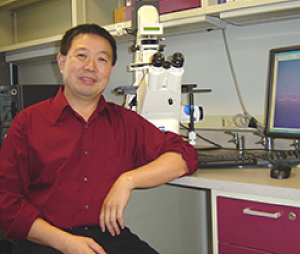Youming Lu's Compound Protects Stroke Victims
By wchung | 02 Jan, 2026
A team led by Youming Lu has developed a compound that can block the mechanism that leads to brain damage during strokes.
A team led by Youming Lu has developed a compound that can block the mechanism that leads to brain damage during strokes. This offers a promising way to protect likely stroke victims as well as suggesting promising ways to help them recover brain function.
Lu, a professor at Louisiana State University, and Sic Chan, an assistant professor at Central Florida University focused their study on glutamate, the major excitatory transmitter in the mammalian central nervous system (CNS). They found that this neurotransmitter opens the NMDA (N-methyl-D-aspartate) receptors, allowing the entry of calcium into nerve cells.
Normally the action of NMDA receptors is held within narrow limits to keep calcium from overloading nerve cells. Lu knew that the calcium regulation process breaks down during a stroke, allowing calcium molecules to flood nerve cells through the NMDA, leading to their death and to brain damage. But the mechanism that caused the calcium overload had been unknown.
Lu’s team discovered that the overload was triggered by an enzyme labeled Death-Associated Protein Kinase 1 (DAPK1) which binds to the NMDA receptor and transmits a cell death signal during strokes.
Reasoning that one way to prevent calcium overload would be to prevent DAPK1 from binding with the NMDA receptors, Lu’s team developed a compound that blocks DAPK1. Their study showed that this compound did protect brain cells against stroke injury without affecting the normal and essential role of the NMDA receptors.
“It is conceivable that this study not only provides new insights into the cellular and molecular basis responsible for stroke damage, but also provides a therapeutic target for stroke therapy,” said Lu.
“Any time we gain an increased understanding of the molecular mechanism of neurodegeneration, that enhances our ability to make better drugs,” said study collaborator Sic Chan.
Youming Lu, a native of China, earned his masters degree at China Pharmaceutical University in 1990. He did a postdoctoral fellowship at Novartis in Basal, Switzerland and a second fellowship at the University of California at Irvine in 1993 and 1995. He worked as an assistant professor at the University of Calgary from 2000 to 2004. He was an associate professor at the University of Central Florida in Orland from 2004 to 2008 before joining the LSU School of Medicine as a professor.

Youming Lu is a Louisiana State University professor who led the development of a compound that can prevent brain cell death during strokes.
Asian American Success Stories
- The 130 Most Inspiring Asian Americans of All Time
- 12 Most Brilliant Asian Americans
- Greatest Asian American War Heroes
- Asian American Digital Pioneers
- New Asian American Imagemakers
- Asian American Innovators
- The 20 Most Inspiring Asian Sports Stars
- 5 Most Daring Asian Americans
- Surprising Superstars
- TV’s Hottest Asians
- 100 Greatest Asian American Entrepreneurs
- Asian American Wonder Women
- Greatest Asian American Rags-to-Riches Stories
- Notable Asian American Professionals

